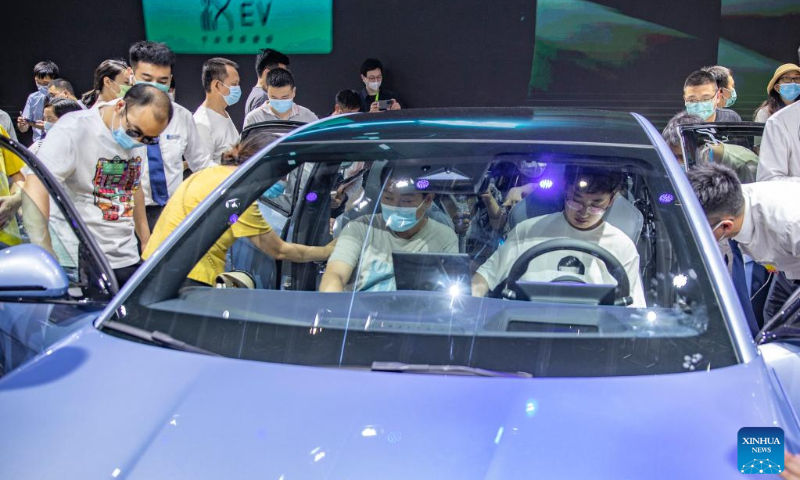
Visitors view a new energy vehicle during the 2022 Chongqing International Auto Exhibition in southwest China's Chongqing Municipality, June 25, 2022.
China's auto production and sales both jumped by more than 20 percent in June from the same period last year, led by a 130 percent growth in sales of new-energy cars, as the industrial chain has apparently shaken off the impact of the COVID-19 epidemic, the work resumption of car companies accelerated and stimulus policies to boost car consumption took effect.
In June, China's car production hit 2.49 million units, up 28.2 percent from the same time last year, while sales increased 23.8 percent to 2.5 million units, after the car industry bottomed out in April, the China Association of Automobile Manufacturers (CAAM) said on Monday.
The CAAM attributed the growth to accelerated industrial chain restoration since June and ramped-up efforts in work resumption. Government efforts to spur car demand such as halving auto purchase tax also helped the market rebound, the CAAM said.
Since May China has been rolling out intensive policies to support car consumption. On May 23, an executive meeting of the State Council, China's cabinet, announced a 60 billion yuan ($8.94 billion) reduction in the purchase tax on some passenger vehicles.
As part of the new efforts, authorities halved the auto purchase tax to 5 percent for cars priced under 300,000 yuan with 2.0-liter or smaller engines, effective from June 1.
The latest data from the State Taxation Administration shows that in the first month after the implementation of the new policy, there was a 7.1 billion yuan reduction in vehicle purchase tax.
In terms of electric vehicles, a State Council executive meeting on June 22 said it was considering a extending the tax break for new-energy vehicles (NEVs).
Data from the CAAM also showed that in June, the production and sales of NEVs hit a record high of 590,000 and 596,000 units respectively, up 130 percent year-on-year. Meanwhile, auto companies exported 1.22 million units in the first half of the year, up 47.1 percent from the same period last year.
In addition to the cut in vehicle purchase tax, local governments have introduced policies to boost car consumption. For example, South China's Guangdong Province is offering an 8,000 yuan subsidy for NEV purchases, while Shenyang, Northeast China's Liaoning Province, has invested 100 million yuan to provide subsidies to individual consumers who buy cars.
The June data shows the stimulus policies have achieved the desired effect, Zhang Xiang, a research fellow at the Research Center of Automobile Industry Innovation of the North China University of Technology, told the Global Times on Monday.
"Promoting automobile consumption is of great help to expand domestic demand and boost the economy. It will increase local GDP, provide more employment opportunities and drive the development of upstream and downstream industries," Zhang said.
Global Times




